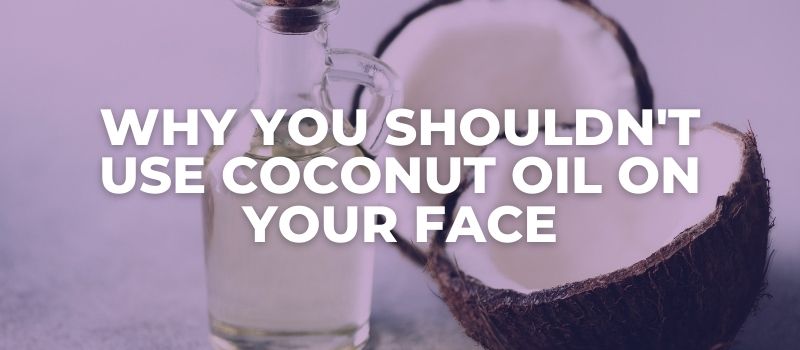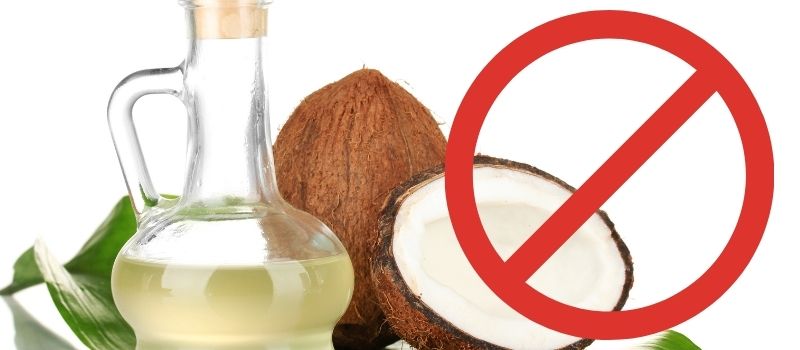Coconut oil in the skincare community is considered to be something of a miracle beauty product and several studies have shown that coconut oil is beneficial for skin health.
This is one of the few products that you don’t really hear a bad word about and it is often used as the main ingredient in many DIY beauty products.
Besides smelling amazing it also moisturizes, heals, and yeah, pretty much lives up to the hype. But as it turns out it might not really be the hero that’s going to save you from all problems skin related.
Coconut oil is a great moisturizer for the body, but not for your face.
Here are 3 reasons why you shouldn’t use coconut oil on your face!:
- Coconut oil is comedogenic (it clogs pores)
- Coconut oil can cause acne breakouts.
- Coconut oil *does not* hydrate your face.

Coconut oil is comedogenic
Coconut oil is listed as a comedogenic product with a rating of 4.
While this might not bother skin types that are on the dry side, it is quite a high rating for oily skin to be messing around with.
Coconut oil has a tendency to clog pores, something that oily skins are naturally prone to and can cause blackheads and even acne breakouts.
It cannot penetrate the pore and because of this, the skin doesn’t get to reap any benefits from this product as it just sits on top of the surface and it’s not being absorbed.
Coconut oil can cause acne breakouts.
Even though coconut oil has long been touted for its moisturizing and cleansing benefits, this ingredient can actually make your acne breakout even worse.
For some people, it can be an effective moisturizer that absorbs fairly well into the skin, provides light to moderate hydration, softens the skin and smells heavenly.
But it is not a very known fact that coconut oil clogs pores and blocks the normal flow of the skin’s sebum.
The sebum that is trapped under the skin is left to do nothing but clog the pores and not allow the skin to breathe through the pores.
This creates a perfect environment for blackheads, whiteheads, and pimples to thrive.
While coconut oil is great for the hair and body, it can actually cause or worsen acne breakouts on the face.
Coconut oil does not hydrate your face.
Give me a minute if this comes as a shocker, it will all make sense soon.
So, while blemished and breakout-prone skin should definitely beware, what about other skin types?
Coconut oil is still an ingredient experts are hesitant to recommend.
Coconut oil can come in handy to soften dry and cracked skin, but only if there is no other alternative available.
A good, hydrating moisturizer that helps to both attract and retain moisture should contain a good blend of these three actives:
- Humectants – which work by drawing water from the atmosphere and retain it in the skin
- Occlusives – which work by providing a physical barrier to reduce water from evaporating from the skin and with this the skin’s moisture level is increased
- Emollients – which improve the condition of the skin by soothing dry and flaky skin cells
While coconut oil is a very good occlusive agent, it does not have the humectant properties needed to hydrate the skin properly.
On the contrary- it’s in fact an anti-humectant, as coconut oil repels water.
Who Can Use Coconut Oil?

While the beauty benefits of coconut oil have definitely been succeeded by modern cosmetic companies, this doesn’t mean that you cannot put coconut oil to use when it comes to hair, body, and even cooking.
Using coconut oil for cooking is absolutely fine as it is a very stable and healthy oil with many natural benefits for general health.
Many people with eczema find that it soothes the inflammation on the skin and relieves symptoms such as dryness and itchiness.
The main symptoms of this condition are normally patches of dry, itchy and scaly skin that depending on the severity may crack and bleed.
The aim of all treatments for eczema is to keep the skin hydrated.
It is not unusual for some medications to cause sensitive skins to react with irritation, so coconut oil may very well be the one natural ingredient that soothes this common condition and lowers the risk of infection.
Coconut oil is, hands down, one amongst the most effective hair treatments for dry and damaged hair.
It works incredibly well for repairing hair that’s been dyed many times and damaged due to harsh chemicals, hair that’s been damaged by the sun or just hair that is naturally dry and nothing else helps.
It is a fairly inexpensive product that I can go as far as to safely say that it can even target conditions such as seborrheic dermatitis.
While coconut oil cannot completely cure this condition, it can absolutely soothe that burning rash on your scalp.

Coconut oil has been used on the skin for centuries and it is the product that lives up to the hype due to its moisturizing and soothing effect.
However, living in today’s world, we have so many more useful cosmetic products available, that:
Coconut oil just doesn’t cut it anymore.
It can still be a great home remedy if there’s a lack of other alternatives present, but besides that, you can nowadays opt for something much more effective for any particular skin concern.

My name is Simone and I am a certified skin specialist. I created this website to teach my readers how to take great care of their skin and I also like to occasionally share my honest opinions on skincare products I’ve tried. You can learn more about me here.

What about fractionated coconut oil? Is that better for the skin because it stays in liquid form and doesn’t clog pores as much?
Depending on what you use it for. I would suggest using it to r remove waterproof mascara and eyeliner as to not damage your eyelashes or tug too harsh on the delicate skin in the eye area.
However, coconut oil is still not a decent moisturizer. It will soften the skin, but it doesn’t have moisturizing benefits. I would still not suggest it to be used as such 🙂